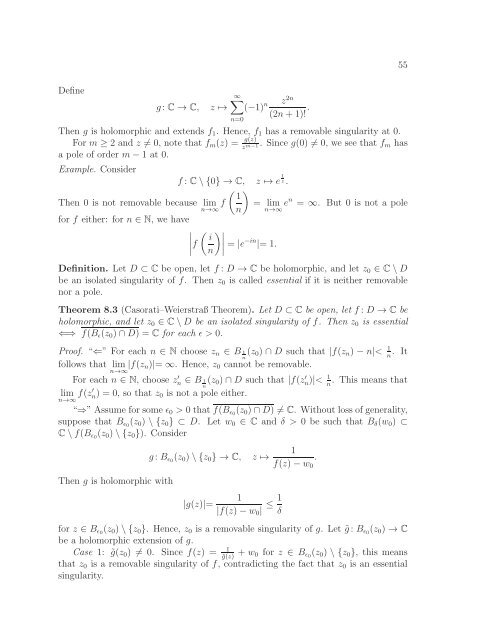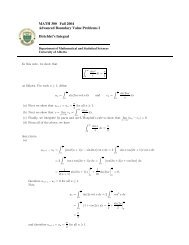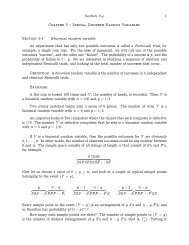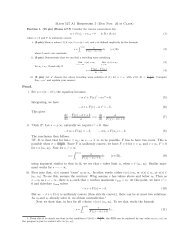Math 411: Honours Complex Variables - University of Alberta
Math 411: Honours Complex Variables - University of Alberta
Math 411: Honours Complex Variables - University of Alberta
You also want an ePaper? Increase the reach of your titles
YUMPU automatically turns print PDFs into web optimized ePapers that Google loves.
Define<br />
g: C → C, z ↦→<br />
∞�<br />
n=0<br />
(−1) n z 2n<br />
(2n+1)! .<br />
Then g is holomorphic and extends f1. Hence, f1 has a removable singularity at 0.<br />
For m ≥ 2 and z �= 0, note that fm(z) = g(z)<br />
zm−1. Since g(0) �= 0, we see that fm has<br />
a pole <strong>of</strong> order m−1 at 0.<br />
Example. Consider<br />
f: C\{0} → C, z ↦→ e 1<br />
z.<br />
� �<br />
1<br />
Then 0 is not removable because lim f<br />
n→∞ n<br />
for f either: for n ∈ N, we have<br />
�<br />
�<br />
�<br />
�f � ��<br />
i ���<br />
= |e<br />
n<br />
−in |= 1.<br />
55<br />
= lim<br />
n→∞ e n = ∞. But 0 is not a pole<br />
Definition. Let D ⊂ C be open, let f: D → C be holomorphic, and let z0 ∈ C\D<br />
be an isolated singularity <strong>of</strong> f. Then z0 is called essential if it is neither removable<br />
nor a pole.<br />
Theorem 8.3 (Casorati–Weierstraß Theorem). Let D ⊂ C be open, let f: D → C be<br />
holomorphic, and let z0 ∈ C\D be an isolated singularity <strong>of</strong> f. Then z0 is essential<br />
⇐⇒ f(Bǫ(z0)∩D) = C for each ǫ > 0.<br />
Pro<strong>of</strong>. “⇐” For each n ∈ N choose zn ∈ B 1<br />
n<br />
follows that lim<br />
n→∞ |f(zn)|= ∞. Hence, z0 cannot be removable.<br />
For each n ∈ N, choose z ′ n<br />
∈ B 1<br />
n<br />
(z0) ∩ D such that |f(zn) − n|< 1.<br />
It n<br />
(z0)∩D such that |f(z ′ n<br />
1 )|< . This means that<br />
lim<br />
n→∞ f(z′ n ) = 0, so that z0 is not a pole either.<br />
“⇒” Assume for some ǫ0 > 0 that f(Bǫ0(z0)∩D) �= C. Without loss <strong>of</strong> generality,<br />
suppose that Bǫ0(z0) \ {z0} ⊂ D. Let w0 ∈ C and δ > 0 be such that Bδ(w0) ⊂<br />
C\f(Bǫ0(z0)\{z0}). Consider<br />
Then g is holomorphic with<br />
g: Bǫ0(z0)\{z0} → C, z ↦→<br />
|g(z)|=<br />
1<br />
|f(z)−w0|<br />
1<br />
.<br />
f(z)−w0<br />
for z ∈ Bǫ0(z0)\{z0}. Hence, z0 is a removable singularity <strong>of</strong> g. Let ˜g: Bǫ0(z0) → C<br />
be a holomorphic extension <strong>of</strong> g.<br />
Case 1: ˜g(z0) �= 0. Since f(z) = 1<br />
˜g(z) + w0 for z ∈ Bǫ0(z0) \ {z0}, this means<br />
that z0 is a removable singularity <strong>of</strong> f, contradicting the fact that z0 is an essential<br />
singularity.<br />
≤ 1<br />
δ<br />
n







